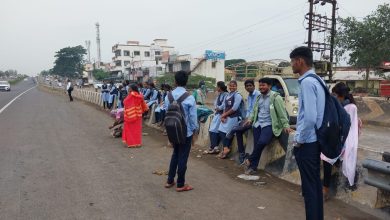Daund Breaking News : A shock to those who are hoping for Patal! Those who do not utter a word for the betterment of the Maratha community will be cut off

[All ready to wash their hands in the flowing Ganga, those who believed that Patil would give them a ticket, lost their sleep]
Daund, 5 Maratha Sangharsh Yoddha Manoj Jarange has started a fight between alleged political leaders to fill his eyes. Many people are ready to wash their hands in the flowing Ganga and are trying to pretend that they are Maratha servants who never utter a word for the betterment of Maratha society. But the general Maratha society is aware of all these things and is aware that someone has a passion for the society and is making a false pretence.
Maratha warrior Manoj Jarange has been protesting continuously for the past year on the issue of Maratha reservation. Jarange Patil is getting unanimous support from the Maratha community. Never has that relationship become common among the Marathas and the true strength of the Marathas is being seen now. The Maratha community is coming together on one word of Jarange, and this has shocked many. On the other hand, opportunistic leaders and some activists are seen struggling to take advantage of this situation. Those who never speak for society are now shining through social media. Self-aggrandizement is being done through social media to pretend that we are real Maratha servants. Who has made such a big splash on social media. Has he really made any special contribution for the development and welfare of the Maratha society? Now seeing the present situation, considering the unity of the Maratha community, their Maratha love has awakened. Assembly and other elections will be held in the next few days. Only from that point of view this love is going away now. Many of them had an opportunity to serve the society earlier. But at that time he never felt that he wanted to do something for the Maratha community.
The political situation in Pune district has changed. Many people are willing to fight from either Mahayuti or Mahavikas Aghadi. On the other hand, the debate about Maratha OBC is still burning. In this background, many people want to fight from Jarange Patil if they do not get the ticket. For this, the leaders and workers of all the parties in the district have met Patal. Many believe that Patil will give them tickets. But since Patal’s role came out yesterday, many have lost their sleep. Many have decided to stand as independents if they do not get tickets from anyone. Therefore, in this background, it is likely that the number of independents will increase in each constituency.
I am ready to contest the election if I am nominated considering the social and community work I am doing. The decision taken by Jarange will be acceptable to me and even if I am not nominated, I will work for the candidate announced by them. Will continue to work under the leadership of Jarange in the future. – Vasant Salunkhe, District President Shivsangram
We will work for the candidate Manoj Jarange will field from Sakal Maratha Samaj in Daund Assembly Constituency. Those who have shown interest in Daund Vidhan Sabha must have shown interest as a part of society. We will do the work of the candidates that Manoj Jarange will give. — Rajabhau Kadam




